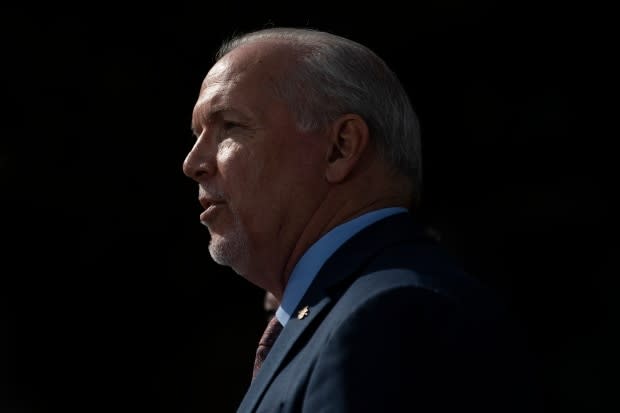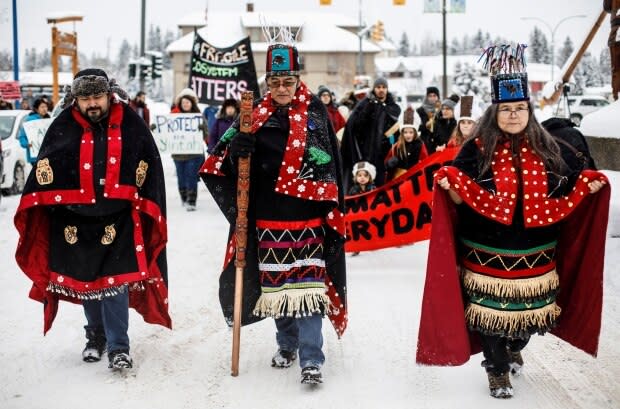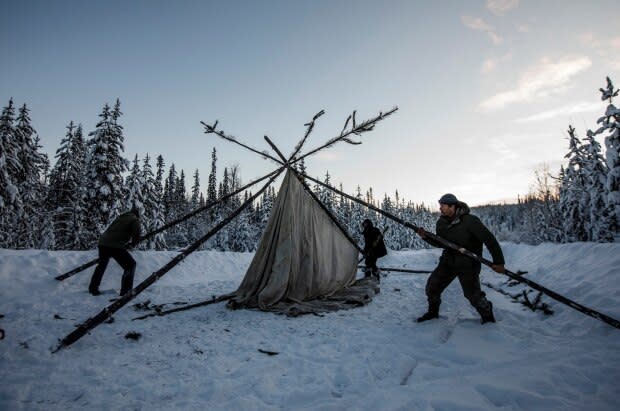'I'm not being disrespectful, I'm just saying be realistic': Horgan defends not meeting Wet'suwet'en chiefs
John Horgan is defending his decision not to meet with Wet'suwet'en hereditary chiefs opposed to the Coastal GasLink pipeline while touring northern B.C., saying his schedule would not permit it and he is committed to seeing the project through to completion.
The premier, who was near Wet'suwet'en territory Friday, while touring the LNG Canada project site in Kitimat, was asked by the chiefs for a face-to-face discussion while in the area, which Horgan declined. Chief Na'moks, who also goes by John Risdale, said only an in-person meeting from the premier demonstrates respect for the chiefs.
"I'm not going to drop everything I'm doing to come running when someone is saying they need to speak with me," said Horgan in an interview on Daybreak North Monday. "I'm not being disrespectful, I'm just saying be realistic here."
Horgan said he had other obligations during this tour but did offer to speak the the chiefs by phone. His offer was not accepted.
"If you're going to have decent communication with anybody, it's best to be looking eye-to-eye," said Na'moks. "We want to show the respect back, too."
An in-person meeting may not change the status quo, as Horgan said he has no plans to pull permits for a project he says is an economic chance for numerous other nations along the pipeline route who do support it.
"I think its disingenuous to suggest that a handful of people can stop progress and success for people who have been waiting for a break like this for many, many years," said Horgan.

Coastal GasLink has signed benefit agreements with all 20 elected band councils along the 670-kilometre pipeline route. But the hereditary chiefs argue band councils only have jurisdiction over reserve lands rather than unceded territories.
The B.C. Supreme Court has granted an injunction against supporters of the hereditary chiefs who have set up camps close to a pipeline work site near Smithers. It authorizes RCMP to arrest and remove anyone contravening the order.
"There is no negotiating to be done," said Horgan.

Judith Sayers, assistant professor of law and business at the University of Victoria and president of the Nuu-chah-nulth Tribal Council, said the project "flies in the face" of Wet'suwet'en's own laws which have existed since time immemorial and need to be acknowledged.
Sayers said under the United Nations Declaration of the Rights of Indigenous Peoples, which passed in the B.C. Legislature in November 2019, Indigenous people have the right to own, use and manage their own lands.
"We've moved into a new era in British Columbia with UNDRIP, which talks about the right of self-determination," said Sayers. "Courts need to be acknowledging the laws of Indigenous people. We haven't seen that happen."

Horgan said UNDRIP is meant to be forward looking, not backward looking and this project was approved in 2018.
There will always be conflict. There is conflict between families, conflict within communities. People don't always agree," said Horgan. "We are doing our level best to move forward on issues in a respectful and methodical way."
The 670-kilometre pipeline will deliver natural gas from the Dawson Creek area to a liquefaction facility in Kitimat as part of a $40-billion LNG Canada project.
To hear the complete interview with Premier Horgan on Daybreak North, tap the audio link below:


